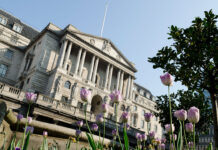UK inflation surpasses Bank of England target of 2% by the end of the year
UK inflation rose again in May, surpassing forecasts by economists and the Bank of England target.
As the country has gone through its stages of reopening, prices for clothes, fuel and meals in restaurants have been pushed up.
The Office for National Statistics revealed on Wednesday that the price of consumer goods rose by 2.1% for the year to May. This was up from 1.5% in April.
The inflation figure was expected to come in at 1.8%.
ONS chief economist Grant Fitzner said: “The rate of inflation rose again in May and is now above 2% for the first time since the summer of 2019.
“This month’s rise was led by fuel prices, which fell this time last year but have jumped this year, thanks to rising crude prices. Clothing prices also added upward pressure as the amount of discounting fell in May.”
Inflation is now at its highest point since before the pandemic which could lead to calls for interest rates to go up.
Paul Craig, portfolio manager at Quilter Investors commented on the implications of today’s inflation figure.
“Inflation is on the up, breaching the Bank of England’s 2% target, yet it remains hesitant to respond by reducing the stimulus it has provided and the quantitative easing that has become so addictive for markets. For now, this is likely the correct decision as we still expect much of the inflation feeding through to be transitory. Wage increases do appear to be coming through, but again this data is so distorted by the furlough scheme that it can’t be seen as a reliable indicator,” said Craig.
Craig added that current levels of inflation are affecting poorer households the most.
“Unfortunately, much of the inflation that is coming through is bad inflation and hitting lower income households in the pocket. How long these price rises continue remains to be seen. Will inflationary pressures be self-defeating or resolved as pent-up demand dissipates or is met with increasing supply. But should it become sustained then it risks making the recovery even more uneven than it already is and thus, it will ultimately fall to government to pull the fiscal levers as it continues in its levelling up agenda.”





